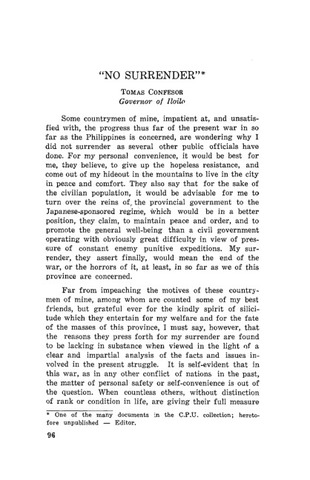"No surrender"
摘要
Some countrymen of mine, impatient at, and unsatisfied with, the progress thus far of the present war in so far as the Philippines is concerned, are wondering why I did not surrender as several other public officials have done. For my personal convenience, it would be best for me, they believe, to give up the hopeless resistance, and come out of my hideout in the mountains to live in the city in peace and comfort. They also say that for the sake of the civilian population, it would be advisable for me to turn over the reins of the provincial government to the Japanese-sponsored regime, which would be in a better position, they claim, to maintain peace and order, and to promote the general well-being than a civil government operating with obviously great difficulty in view of pressure of constant enemy punitive expeditions. My surrender, they assert finally, would mean the end of the war, or the horrors of it, at least, in so far as we of this province are concerned.
Far from impeaching the motives of these countrymen of mine, among whom are counted some of my best friends, but grateful ever for the kindly spirit of solicitude which they entertain for my welfare and for the fate of the masses of this province, I must say, however, that the reasons they press forth for my surrender are found to be lacking in substance when viewed in the light of a clear and impartial analysis of the facts and issues involved in the present struggle. It is self-evident that in this war, as in any other conflict of nations in the past, the matter of personal safety or self-convenience is out of the question. When countless others, without distinction of rank or condition in life, are giving their full measure of immolation on the field of battle in the defense of our country against the invaders, there is no sensible reason whatsoever why the governor of this province should withhold from the motherland the sacrifice of such a small matter as personal convenience. Surely, it is not becoming to the dignity of the exalted position which I now occupy to hold the safety of my person over and above the future of the people who have elevated me to the seat of power not merely to serve them, as it is my solemn duty to do, but also to provide them with the guidance and inspiration which they so sorely need in this their dark hour of great perplexity. For me to surrender now would be to invite upon myself the charge of moral cowardice, for which I shall ever be stigmatized even long after my body shall have crumbled into dust.
描述
Journal article
From the papers of the late Tomas V. Confesor, Governor, Panay and Romblon, Civil Resistance from the CPU collection of World War II documents


